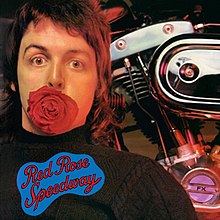Red Rose Speedway
| Red Rose Speedway | ||||
|---|---|---|---|---|
 |
||||
| Studio album by Paul McCartney and Wings | ||||
| Released | 30 April 1973 (US) 4 May 1973 (UK) |
|||
| Recorded | March–June 1972 and September–December 1972 | |||
| Studio | Abbey Road Studios, Olympic Sound Studios, Morgan Studios, Trident Studios, Island Studio (all London) | |||
| Genre | Rock, pop rock, soft rock | |||
| Length | 42:13 | |||
| Label | Apple | |||
| Producer | Paul McCartney | |||
| Paul McCartney and Wings chronology | ||||
|
||||
| Singles from Red Rose Speedway | ||||
|
||||
| Professional ratings | |
|---|---|
| Review scores | |
| Source | Rating |
| AllMusic | |
| Robert Christgau | D+ |
| The Essential Rock Discography | 5/10 |
| MusicHound | 2/5 |
| Q | |
| Rolling Stone | (favourable) |
| The Rolling Stone Album Guide | |
Red Rose Speedway is the second album by Paul McCartney and Wings and the fourth by McCartney since leaving the Beatles. The album was released in 1973 after the relatively weak commercial performance of McCartney's previous, Wild Life, which had been credited to the then-unknown Wings. Red Rose Speedway reached number 1 on the Billboard 200. "My Love" was a number one single and the most successful track from the album.
In early 1972, McCartney decided to expand Wings to a five-piece band, by adding another guitarist, and to begin touring with the group. The group spent many months on the road across Europe, beginning with a tour of British universities.
Despite not releasing an album in 1972, Wings managed to release three singles: "Give Ireland Back to the Irish" which was banned by the BBC for political reasons; "Mary Had a Little Lamb"; and "Hi, Hi, Hi", which was banned by the BBC for drug references and sexually suggestive lyrics.
Recording for Red Rose Speedway began in March 1972. It was initially planned as a double album, and McCartney decided to include some unreleased songs that had originally been recorded during the Ram sessions prior to the formation of Wings. Two of those songs, "Get on the Right Thing" and "Little Lamb Dragonfly", appeared on the final album. Beginning on 19 March, sessions were held at Olympic Studios in London, after which recording continued sporadically throughout the year.Glyn Johns was invited to produce the Olympic sessions, but after a series of disagreements with McCartney, he quit the project on 17 April, saying: "Now we have respect for each other." More recording took place over October and November 1972 at Abbey Road Studios and Olympic.Morgan, Trident and Island were the other London studios where the band recorded that year.
...
Wikipedia
